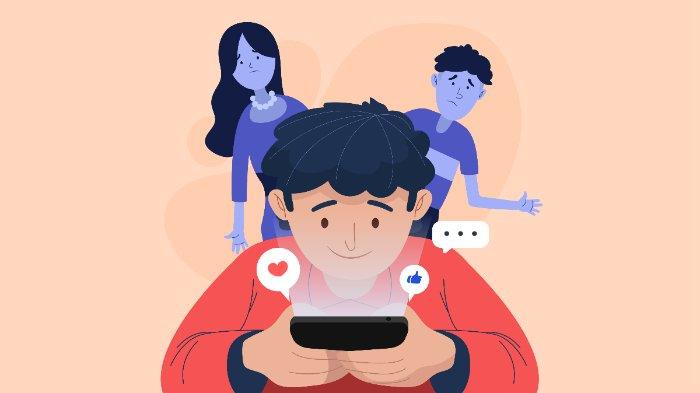Diksia.com - This is the importance of netiquette, which can help Internet users interact. Netiquette is short for network etiquette or internet etiquette.
Simply put, netiquette (pronounced netiquette) is etiquette or ethics in cyberspace.
According to KBBI, morals are procedures (customs, manners, etc.) in a civilized society for maintaining good relationships between people.
As a US-based cognitive behavioral therapy (CBT) expert, Avigail Lev, it’s important to know and apply Internet etiquette so that online interactions can be positive and mutually respectful.
The basic rule of netiquette is not to do, say or write on the Internet what you would not do, say or write offline.
Here are at least 10 main rules of internet etiquette reported by verywellmind.com:
1. Make real people a priority
There is nothing more annoying than communicating with someone who is using their phone, tablet or other electronic device.
This is known as phubbing. Phubbing is the behavior of a person who is engrossed in dealing with other people in gadgets
Especially when you are alone with your partner, your parents or your children.
Constantly checking Instagram or sending messages to other people through messaging apps makes it seem like you don’t care about the people around you.
If someone tries to talk to you while you’re using a device, stop what you’re doing and face them.
Anything that happens in the online world can generally wait.
2. Use polite language
Don’t intentionally name people, don’t criticize them, or express offensive opinions.
If you don’t dare or don’t want to deliver it directly in the real world, then don’t do it on the internet.
Online activities leave digital footprints that are difficult to erase.
Information and content shared online can be saved, archived or shared by others, even if you later delete it.
What you post online is permanent and can be used against you.
3. Share wisely
Be careful not to post too much about yourself online.
Do not post graphic images, images of alcohol or drug use, or any other information about your personal life online.
Viewers can save it and the digital way will forever be accessible to many people.
Even if you later try to delete this post, it might be too late.
To avoid this, before posting, ask yourself if this post will cause problems with your boss, friends, parents or neighbors.
4. Don’t share too much
Don’t post too much personal stuff.
Like your favorite color, your first car, the city you were born in, because these can be used by scammers to steal your identity and information.
Be careful with any information that could be used when answering security questions in your personal account.
Also, avoid publicly uploading vehicle registration numbers, full addresses, and resident identification numbers.
5. Don’t exclude others
Let’s say you’re surfing social media with a friend.
If you laugh when you come across a funny joke, meme or video and you don’t want to share it with your close friends, save it for later.
Don’t make your friends or special people around you feel left out.
When people feel left out, it can lead to negative emotions.
6. Choose friends wisely
Rather than removing someone from your social media friends list, think twice before sending a friend request or accepting an invite.
If you don’t want to be long-term friends with someone, it’s good netiquette not to add them in the first place.
To keep in touch with co-workers without adding them as a Facebook friend, tell them you only use Facebook for close personal friendships.
Suggest that you network on other platforms like LinkedIn or other professional networking sites to stay connected.
Then, if you don’t agree with people in the real world, it’s okay to “end” your friendship in cyberspace.
7. Respect people’s privacy
For example, if you want to upload a photo or video online in a WA status or Insta story that includes other people, it is better to ask permission first.
Not everyone wants to be published online.
Add tags to posts in public spaces and on your personal social media pages.
Remember, if you tag someone on Facebook or Instagram, others can access the photo unless the person in it has adjusted their privacy settings.
8. Respond to messages instantly
If you receive spam, commercial or other unsolicited messages, you are under no obligation to respond to such messages.
However, reply instantly to incoming messages on your messaging app from family, friends or co-workers.
If you don’t have time to reply to a message because you have other important things to do, tell them not to wait.
9. Update your information online
Don’t leave inaccurate information online just to avoid the hassle of updating your social media profiles.
Include the latest information about your business on your business website.
For example, always update your business hours listed on Google Business or on Instagram and WhatsApp profiles.
If you cannot update your website information regularly, it is better to delete it.
Provide your personal information on professional platforms such as LinkedIn.
If potential employers find outdated or outdated information on your professional networking site, they may think you are not interested enough in the job.
10. Don’t spam
The term “Spam” is used for receiving unsolicited messages.
In the online world, spam can refer to unsolicited email, text messages, or social media messages.
Most of us are familiar with spam calls or emails from companies we are not allowed to contact.
However, we may also receive spam from family and friends, for example when they repeatedly contact us asking to join their business.
If you think your message hasn’t been answered for too long, try calling or contacting us through another platform.






